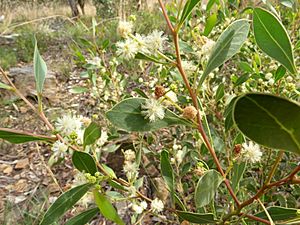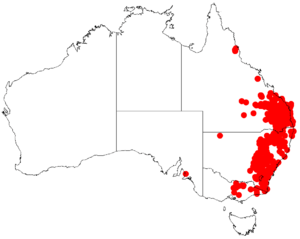Mountain hickory wattle facts for kids
Quick facts for kids Hickory wattle |
|
|---|---|
 |
|
| Scientific classification |
|
| Kingdom: | Plantae |
| Clade: | Tracheophytes |
| Clade: | Angiosperms |
| Clade: | Eudicots |
| Clade: | Rosids |
| Order: | Fabales |
| Family: | Fabaceae |
| Clade: | Mimosoideae |
| Genus: | Acacia |
| Species: |
A. penninervis
|
| Binomial name | |
| Acacia penninervis |
|
 |
|
| Occurrence data from AVH | |
| Script error: The function "autoWithCaption" does not exist. | |
| Synonyms | |
Script error: No such module "Check for conflicting parameters".
The Hickory Wattle (scientific name: Acacia penninervis) is a type of shrub or tree that lives for many years. It's also known as mountain hickory wattle or blackwood. This plant is native to eastern Australia.
Contents
What the Hickory Wattle Looks Like
This plant can grow as a shrub or a tree, usually reaching a height of 2 to 8 meters (about 6 to 26 feet). It can grow straight up or spread out. Its bark is often dark grey and has fine cracks or deep grooves.
The young branches are smooth and round. Sometimes, they have a fine white powder on them. Like most Acacia plants, the Hickory Wattle has special leaf-like structures called phyllodes instead of true leaves. These phyllodes are smooth and stay green all year. They are shaped like a narrow spear or oval, measuring 5 to 15 centimeters (about 2 to 6 inches) long and 7 to 40 millimeters (about 0.3 to 1.6 inches) wide. They have a clear main vein and veins along the edges. The plant produces pale yellow flowers throughout the year.
How the Hickory Wattle Was Named
The Hickory Wattle was first officially described by a botanist named Augustin Pyramus de Candolle in 1825. He included it in his book about plants. Later, in 1986, another botanist named Leslie Pedley reclassified it under a different name, Racosperma penninerve. However, in 2006, it was moved back to the Acacia group.
Different Types of Hickory Wattle
There are a couple of different types, or varieties, of the Hickory Wattle:
- Acacia penninervis var. longiracemosa
- Acacia penninervis var. penninervis
Where the Hickory Wattle Grows
You can find the Hickory Wattle growing naturally in several Australian states. These include the Australian Capital Territory, New South Wales, Queensland, and Victoria. It has also been introduced to New Zealand's North and South Islands, meaning it was brought there by people.
The variety A. p. var. penninervis grows in the same Australian states. The other variety, A. p. var. longiracemosa, is found along the coast of southern Queensland and northern New South Wales.
Uses of the Hickory Wattle
In 1889, a book called 'The Useful Native Plants of Australia’ mentioned that this tree was known as "Hickory" and "Blackwood." The book also recorded an interesting use by the Aboriginal people of southern New South Wales. They would use the bark (and sometimes the leaves) of this tree to help catch fish. They would put these parts of the plant into a waterhole. This would make the fish come to the surface, making them easier to catch.
The bark of the Hickory Wattle contains about 18% tannin. Tannin is a substance used in many industries, including making leather. The plant is also used in environmental management projects.
 | Madam C. J. Walker |
 | Janet Emerson Bashen |
 | Annie Turnbo Malone |
 | Maggie L. Walker |

